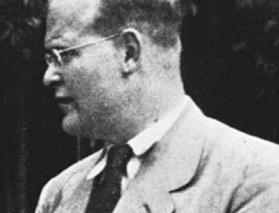 This was originally a sermon preached at Redemption Church on 11 NOV 2014. If you are a pastor, please feel free to copy and steal.
This was originally a sermon preached at Redemption Church on 11 NOV 2014. If you are a pastor, please feel free to copy and steal.
One of the important aspects of our discipleship, often overlooked, involves the understanding that our relationship with God didn’t just appear out of thin air. Our faith has a history reaching back long before our lifetime. From Abraham, Isaac, & Jacob, to the priests and prophets of the Old Testament; from the early church leaders like Peter, James, and Paul
To the Greek fathers, and the desert mystics; from Augustine, Francis, Aquinas, Luther, Calvin to the saints of our own lives: parents, grandparents, siblings, pastors, Sunday school teachers, & youth workers, someone in our past involved us in the communion of the saints.
This life of faith we enjoy (our relationship with God) isn’t something we generated, it was passed down to us by saints, great and small; people who connected us to this rich heritage we call Christianity. So remembering the lives of the saints who built up the church is an important aspect of our own discipleship. We need to learn their stories and teach them to our children.
This is why each year, from All Saints Day to Advent, we take four weeks to study the lives of four great saints of the church. We do this hoping that as we tell their stories we can learn to see how God has acted in the past, and how faithful people responded in obedience. We strain to listen to their stories, believing their lives will speak to us once again.
We start today with a saint named Brennan Manning. If we were to nominate a patron saint for Redemption Church, Brennan Manning would be on the short list. We call ourselves a ragamuffin church, and the reason we do is that Brennan Manning wrote a book in 1990 called The Ragamuffin Gospel. I looked yesterday & it is currently the number one bestseller in Christian discipleship at Amazon. Almost 25 years later this short book is still speaking to the church.
Brennan was a recovering alcoholic, and he brought that raw openness of AA to his faith & teaching… he wrote: “When I get honest I admit I am a bundle of paradoxes. I believe and I doubt, I hope and get discouraged, I love and I hate, I feel bad about feeling good, I feel guilty about not feeling guilty. I am trusting and suspicious. I am honest and I still play games. Aristotle said I am a rational animal; I say I am an angel with an incredible capacity for beer.” (26)
Brennan thought that the church cared too much about appearances. “We think salvation belongs to the proper and pious,” he wrote, “to those who stand at a safe distance from the back alleys of existence, clucking their judgments at those who have been soiled by life.” (24) He thought this caused the church to reject the ragamuffins of the world, and in the process, miss out on the grace that only comes to those who know they are broken.
Brennan was so passionate about ragamuffins because he believed that our brokenness is what connects us to God’s grace. He wrote: “When I go to church I can leave my white hat at home and admit I have failed. God not only loves me as I am, but also knows me as I am. Because of this I don’t need to apply spiritual cosmetics to make myself presentable to Him. I can accept ownership of my poverty and powerlessness and neediness.” (25) He also said, “Never confuse your perception of yourself with the mystery that you really are accepted.” (29)
Manning is giving an important warning: never confuse your perception of yourself with the real you. The “you” that is carefully edited, smoothed out, & shined up so everyone will like you… never think that “you” is the real you. The real you is way more broken than that. The real you is not the you that you put on for public consumption.
And Brennan’s message was: until you allow the real you, warts and all, to come into the open and receive God’s grace, you’ll never know the depths of God’s love for you, you’ll never experience the reality that you are forgiven and accepted by God in your brokenness. Manning was convinced God sees us as his little children, wallowing in poverty and despair, and God scoops us up, takes us home, and teaches us a better way to live. This God has all the time in the world to see it thru to the end. Manning (& this was sheer gift), gave us permission to call ourselves ragamuffins—and for many of us the name just fit.
“Many of us pretend to believe we are sinners,” he said. “Consequently, all we can do is pretend to believe we have been forgiven.” How stunning is that? If we only pretend to own up to our brokenness, we can only pretend to experience God’s forgiveness. Manning noticed that those who have NOT experienced God’s forgiveness, find it difficult to forgive each other. “Something is radically wrong,” Manning wrote, “when the local church rejects a person accepted by Jesus… Any church that will not accept that it consists of sinful men and women, and exists for them, implicitly rejects the gospel of grace.” (30)
And its not like Manning wanted us to go easy on this thing called sin. He wrote, “though it is true that the church must always dissociate itself from sin, it can never have any excuse for keeping any sinners at a distance… if it is constantly aware of its guilt and sin, it can live in joyous awareness of forgiveness.” (30) The awareness of sin gives us the awareness of forgiveness.
When I first read A Ragamuffin Gospel, all I could think of was: I’d give anything to be a part of a church like that. I wasn’t alone. Many people latched onto this message, & Brennan became a huge success. He started speaking a ton, drawing huge crowds, selling thousands of books. A big part of his testimony in his talks and books involved admitting that he was an alcoholic. He spent several stints in rehab & had to struggle for his sobriety.
Brennan died last year, and the last thing that he wrote was this short memoir in which he admitted that for much of the time he was travelling & speaking & being a big deal, he was still in the throes of an active addiction to alcohol. He’d speak at an event, stop at a liquor store, go back to the hotel and get bombed. He’d dry out, then go on another bender; all of this while he let people believe he was sober. In truth Brennan struggled with alcohol until, as an old man he became too sick to take care of himself. He was a ragamuffin to the bitter end.
The scriptures are actually full of examples of people that God used, even though they were deeply flawed. I’m tempted to think that all saints were less than saintly in one way or another. One of the most profound examples of this is found in the life of Moses.
Exodus 2:11-24
11 One day, after Moses had grown up, he went out to his people and saw their forced labor. He saw an Egyptian beating a Hebrew, one of his kinsfolk. 12 He looked this way and that, and seeing no one he killed the Egyptian and hid him in the sand. 13 When he went out the next day, he saw two Hebrews fighting; and he said to the one who was in the wrong, “Why do you strike your fellow Hebrew?” 14 He answered, “Who made you a ruler and judge over us? Do you mean to kill me as you killed the Egyptian?” Then Moses was afraid and thought, “Surely the thing is known.”15 When Pharaoh heard of it, he sought to kill Moses. But Moses fled from Pharaoh. He settled in the land of Midian, and sat down by a well. 16 The priest of Midian had seven daughters. They came to draw water, and filled the troughs to water their father’s flock. 17 But some shepherds came and drove them away. Moses got up and came to their defense and watered their flock. 18 When they returned to their father Reuel, he said, “How is it that you have come back so soon today?” 19 They said, “An Egyptian helped us against the shepherds; he even drew water for us and watered the flock.”
20 He said to his daughters, “Where is he? Why did you leave the man? Invite him to break bread.” 21 Moses agreed to stay with the man, and he gave Moses his daughter Zipporah in marriage. 22 She bore a son, and he named him Gershom; for he said, “I have been an alien residing in a foreign land.” 23 After a long time the king of Egypt died. The Israelites groaned under their slavery, and cried out. Out of the slavery their cry for help rose up to God. 24 God heard their groaning, and God remembered his covenant with Abraham, Isaac, and Jacob. 25 God looked upon the Israelites, and God took notice of them.
Moses, as you can tell, seemed to struggle with anger his entire life. In this passage he committed a cold-blooded murder. He got a bit testy at the well in Midian, driving away the shepherds (who, by the way, were just doing their jobs). Anger made him destroy the tablets when he saw the people worshipping a golden calf. He got angry with Pharaoh, angry with his own people, angry with himself, and angry at God.
He was also suffering from a stammer/stuttering problem of some sort. When God asked him to return to Egypt and speak for God to the Egyptian Pharaoh, Moses cited his stutter as a legit reason why he couldn’t go.
More than that, though, Moses seemed to have what today we would call an identity issue. He was born to a Hebrew mother & father, but was raised in the palace by Pharaoh’s daughter, as an Egyptian. It must have all been very confusing for Moses. Scholars note that in this text, no one calls Moses by name except the narrator. Did you notice that when Moses reprimands the two Hebrew men for fighting, they identify him as a Hebrew, but when the Midianite women identify him they call him an Egyptian? In reference to himself Moses can only bring himself to use the word “alien.”
Moses had this fluid & unsettled identity… an outsider everywhere he went. He was part of Pharaoh’s family, but they all knew he was an Israelite. This pain of his seems punctuated by the fact that Pharaoh was pretty quick to pull the trigger when Moses killed the slave-driver. The dead giveaway, though, is that he names his firstborn Gershom: ger is a noun which means “alien”; sam an adverb meaning “there.” Moses is naming more than just a child. This part of the narrative culminates in Moses’ statement: “I have been an alien (ger), residing in a foreign land.” The word is actually nakeri which means foreigner.
Moses had an identity problem.
Was he Egyptian? …because he was being hunted by Pharaoh.
Was he Jewish? … because he was apparently unwelcome among the Jewish people.
By the time he ran off to hide in Midian, Moses was a consummate outsider; an alien residing in a foreign land.” And yet, when God heard the cry of his people suffering in slavery under Pharaoh, he called Moses to help. One would think Moses would be excited, but he’s really not. If you look at Moses’ response, you see a man of deep insecurity, and unsettled identity:
Ex. 3:11 “Who am I that I should go to Pharaoh?”
Ex. 3:13 “If they ask me ‘what is [God’s] name, what shall I say?”
Ex. 4:1 “What if they do not believe me or listen to me?
Ex. 4:10 “But I am slow of speech and slow of tongue.”
Ex. 4:13 “O my Lord, please send someone else.”
Moses was a total ragamuffin. In the first place, he was still a wanted man back in Egypt. In the 2nd place, he has misgivings about his leadership qualifications (herding sheep doesn’t exactly qualify one to lead a nation). So Moses wants a few guarantees (& who wouldn’t!). But all he could get that burning bush to promise was “I am… with you.”
This doesn’t seem to be enough for Moses. And why should it be? I don’t think it would’ve been enough for me. He was a struggler, a ragamuffin with identity issues, anger issues, speech issues, clearly some confidence issues. He tried everything he could think of to get out of God’s call. All God would promise was “I am with you,” as if that were enough.
Barbara Brown Taylor says what God was actually saying was: “Never mind who you are. What matters is who I am and that I have chosen you” …which is, you know, a brilliant sentence. Moses says: Why you wanna put me up against Pharaoh? I have anger issues, speech issues, confidence issues, identity issues, I don’t even really know who I am, and God says, “It doesn’t matter who you are, it matters who I AM, and I Am, who I am.” That’s the deep wisdom…
And of course this is true for every single one of us in our own lives. It doesn’t matter so much who we are, and how we are broken. It matters who God is. It doesn’t matter who I am, that is, unless I go into hiding, & live safety mode, & put a pretty face on everything. But if I do that, then it doesn’t really matter who God is, because I have made myself utterly alone in my own brokenness. That’s the move that Brennan couldn’t stand to see people make. Because that’s the move he had made for so much of his life.
Brennan had a similar identity issue to the one Moses had. Was he a drunk, or was he a preacher? This is punctuated by the fact that his name wasn’t really Brennan. It was Richard. Actually it was Richard Francis Xavier Manning, born 1934, in Brooklyn, NY. He had a big brother, Robert, and a little sister, Gerry. He grew up during the great depression & WWII, in a completely dysfunctional household. His father was an alcoholic, and his mother was orphaned when she was only 3, and she grew up in an orphanage. She was completely unable to show Brennan love or affection.
Brennan told this story of his childhood. “She would often come home… and I would run and throw my arms around her, only to be pushed away. You’re such a nuisance go sit in the corner and shut up.” Brennan was this sensitive kid, and this kind of treatment scalded his soul. He tells this story of lashing out at her one day.
”You love Robert more than me, don’t you? You’ve always loved him more! I hate you!” My mother looked stunned, but I didn’t relent. I continued to accuse her. ‘The truth is Robert’s always been your favorite you’ve always been kind to him and mean to me.” …My mother then stormed toward me and began punching me, over and over, to the point where I fell to the floor. She straddled me and continued to punch me, screaming, ”Shut up! shut up!”
He was 8 years old. When he was 10, he saved up money, went to Woolworth’s & bought his mother a nice notepad for Christmas. On Christmas morning his parents, his brother & sister, and grandparents were all together. Brennan said, “She tore the wrapping paper away and just stared at the notepad. “What in God’s name am I going to do with this? What a waste of money.” She threw it back at Brennan… can you imagine? He was 10.
His mom was in all kinds of pain & was transmitting it to her children constantly. Brennan’s way of dealing with it was to close off emotionally. But, when you numb your pain, it comes out in other ways. The way his pain escaped his body was thru a horrendous addiction to alcohol.
Brennan started drinking when he was 16. He had a job as a delivery boy, & he would drink his earnings every Saturday. He would later describe it as shooting himself “in the head in some strange time warp where the bullet takes many years to find it’s target.” By the age of 18, he was given the nickname “Funnel.” That was the year of his first blackout.
Brennan said that drunks have a saying about the blackout: “The feathers on your chin mean you ate the parakeet.” But, Brennan knew it was just a family thing, and an Irish Catholic thing. The family thing meant the pain & drinking. The Irish Catholic thing meant that he was a passionate spiritual seeker.
This was his identity struggle… the one that mirror’s Moses’ issue. He was an angel with an incredible capacity for beer. He went to St. John’s University for 2 years, joined the Marines & went to Korea, came back & went to the University of Missouri to study journalism. But he left when he felt the call to enter a Franciscan seminary. After a week he was going to drop out, but as he was in the chapel praying, he had his ragamuffin moment. Somehow God’s love broke thru all the walls he had built around his heart, the pain of an abusive mother, and an alcoholic father, his own addiction, and for the first time in his life he experienced the love of God. So he stayed in seminary and became a Franciscan friar, taking the name Brennan.
He quit drinking, finished college, did one year at Columbia, 4 years of seminary, & was ordained a priest.
All the while Brennan began to understand that he was a mystic & he wanted to go deeper in his prayer life. So in the late 60s he went to Spain to join the Little Brothers of Jesus, an order committed to living among the poor. In Spain, he built chicken coups & hauled water in a wooden cart pulled by a donkey. In France he washed dishes. In Switzerland he voluntarily checked himself into a Swiss jail with hardened criminals. Only the guard knew who he was. Brennan used to say that you never asked what someone was in for, because they’d just say, “It’s none of your business.” So when they asked him why he was there, he’d just say, “It’s none of your business,” and nobody ever knew he was a Franciscan friar there to pray for them & serve them.
At one point Brennan spent 6 months living alone in a desert in Spain. Once a week someone would drop off food, water, and kerosene, but he never saw another soul for 6 months. When asked why he did all that crazy stuff, Brennan would say “When you go on a honeymoon, does anybody ask you what you did for two weeks? I went there for similar reasons… to find an emotional intimacy with God.”
During his time in the desert Manning believed he received a calling: “The work that God has given me to do” Manning wrote, “is helping people to enter the existential experience of being loved in their brokenness.” This call would require Brennan to head home to America. He began teaching, and counseling students. Soon he was travelling and speaking, and after a long stretch of sobriety, he started drinking again.
The rest of the story is too long for me to tell (All is Grace is his memoir, I highly recommend it). He left the priesthood because he fell in love & wanted to get married. He spent six months in rehab and dried out. He was sober for a decade and relapsed… more treatment, and another decade of sobriety, then a relapse. This time it got ugly. He was travelling constantly, drinking on the sly, and it tanked his marriage, and took a huge toll on his body.
Yet, during that time he wrote some of the most meaningful books I’ve ever read, and gave talks that liberated literally thousands of people from bondage to self-hatred (including my hero Rich Mullins & in some ways me).
Isn’t that strange? He was battling his own demons, while at the same time setting others free from theirs by convincing them God loves them. This is how God often works—stuttering prophets and drunk preachers.
Phillip Yancy says, you might be tempted to look at Brennan and wonder what might been if he had not given in to drink. Yancy said that he looks at Brennan and wonders what might never have been Brennan had not discovered grace.
Brennan’s friend Michael Card tells a story. Once Manning had just had a back injury that required surgery. He flew into Nashville to speak. When Card picked him up at the airport he looked terrible. He had on a back brace, still had an IV in his arm and actually had a catheter (clearly pre-911 airport regulations here). Card said he looked so fragile that Card tried to get him to get on a plane and go home. But Manning said, “No, I need to be at this event, it’s important.” They got to the event and it was no big deal, it was just a bunch of high school high school kids.
This strange thing would happen to Manning now and then. He’d get on stage and wouldn’t be able to remember his talk. The words just wouldn’t come. So he just stood there silently, and asked the people to pray for him until he could get going again.
Card said, “I remember the principal of the high school with his head in his hands weeping because he was so convicted by what Brennan had to share. When I saw his response and the reaction of many of these high school students who are so difficult to reach, I realized… that’s why he knew this was something that he was supposed to do, even though he wasn’t feeling like it. I think that was a very Christ-like example of how great strength comes through weakness.”
I think more than anything what I learn from Brennan Manning’s life, is also what I learn from Moses’ life: It’s not the perfection of the gift that God requires, it is the giving of the gift. Let that sink in for a moment. That’s you. That’s your life.
We can never forget that God only ever works with whatever broken thing we give him. Moses was a murderer, who ran away like a coward, and stuttered for the rest of his life.
Brennan was a ragamuffin who struggled wan addiction to alcohol, and preached about grace like nobody I’ve ever heard.
What’s your thing?
We all have addictions. It may not be alcohol or drugs, but we all have an addiction of some kind. It might be gossip, or food, or pills, or anger, or fear, or a grudge. You might be addicted to shopping, or approval, or success. In our day, the addiction to pornography is rampant (literally dozens men & women in our church who are struggling w/it).
These struggles may not be evident on the exterior of our lives, but the damage to the soul is just the same—the shame & self-hatred, and fear, and despair, and hiding. All of us have some sinful pattern we struggle with again & again; something that tries to name us falsely & we can’t get past it. So we struggle with our own identity: am I a saint, or am I a sinner? And for most of us, the struggle is never going to go away. We all have something, some addictive pattern of sinfulness. Just because yours isn’t obvious doesn’t mean it’s not just as destructive.
So maybe even Brennan’s addiction can teach us that if God is only going to work with whatever broken thing we give him, then maybe we should just give him ourselves. Maybe we should just give our lives to God—not as they ought to be, but just as they are.
Brennan has this famous quote, and I want us to end with this today:
















